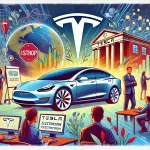Tesla, Inc., known for its cutting-edge electric vehicles (EVs) and renewable energy solutions, has revolutionized not just the automotive industry but also the way cars are marketed and sold. Unlike traditional automakers, Tesla employs a unique marketing strategy that heavily relies on social media, direct sales, and test drives. This article delves into Tesla’s marketing tactics, comparing them with those of other car manufacturers, and evaluates the effectiveness of Tesla’s approach in building its brand and driving sales.
Social Media as a Key Marketing Tool
One of the cornerstones of Tesla’s marketing strategy is its use of social media. CEO Elon Musk is particularly active on platforms like Twitter, where he has a massive following. Musk uses his personal account to make major announcements, share company updates, and engage with customers and fans directly. This approach creates a sense of transparency and accessibility, fostering a strong connection between Tesla and its audience.
Additionally, Tesla leverages other social media platforms such as Instagram, Facebook, and YouTube to showcase its products, share user-generated content, and broadcast live events. This strategy not only increases brand visibility but also encourages community engagement and loyalty. By creating a vibrant online presence, Tesla effectively reaches a global audience without relying on traditional advertising channels.
Direct Sales Model
Unlike most automakers that depend on a network of dealerships, Tesla employs a direct sales model. Tesla’s vehicles are sold through company-owned showrooms and online. This approach allows Tesla to maintain control over the customer experience, from the initial interaction to the final sale. It also eliminates the middleman, which can lead to cost savings that are passed on to the consumer.
Tesla’s showrooms are typically located in high-traffic areas like shopping malls, where potential customers can see and learn about the cars in a relaxed, non-pressured environment. The sales staff are not paid on commission, which aligns their interests with those of the customer and enhances the buying experience. Moreover, Tesla’s online sales platform is streamlined and user-friendly, enabling customers to configure and purchase their vehicles with ease.
Test Drives and Customer Experience
Test drives play a crucial role in Tesla’s marketing strategy. The company frequently hosts events where potential buyers can test drive Tesla vehicles. These events are designed to give customers firsthand experience of the performance, technology, and unique features of Tesla cars. By allowing people to experience the vehicles in real-world conditions, Tesla effectively demonstrates the superiority of its products over competitors.
Moreover, Tesla’s focus on customer experience extends beyond the test drive. The company has a robust referral program that incentivizes existing customers to promote Tesla to their friends and family. This word-of-mouth marketing is powerful, as satisfied customers often become enthusiastic brand ambassadors. Additionally, Tesla’s over-the-air software updates ensure that customers’ vehicles are always up-to-date with the latest features and improvements, enhancing long-term satisfaction and loyalty.
Comparison with Traditional Automakers
Traditional automakers typically rely on extensive advertising campaigns, including television commercials, print ads, and billboards. They also depend heavily on their dealership networks to handle sales and customer interactions. While this approach has been effective for decades, it often involves significant costs and can sometimes lead to a fragmented customer experience due to varying dealership practices.
In contrast, Tesla’s minimalist marketing approach, focusing on direct customer engagement and digital channels, has proven to be highly cost-effective. Tesla spends a fraction of what traditional automakers allocate for advertising, yet it has managed to build a highly recognizable and respected brand. The direct sales model also provides Tesla with valuable data on customer preferences and behavior, enabling the company to refine its products and services continually.
However, there are challenges associated with Tesla’s approach. The direct sales model faces legal restrictions in some states and countries that require cars to be sold through franchised dealerships. Additionally, the reliance on social media and word-of-mouth can limit reach compared to traditional mass media advertising.
Conclusion
Tesla’s marketing strategy is a testament to the power of innovation and direct customer engagement. By leveraging social media, employing a direct sales model, and focusing on providing exceptional customer experiences through test drives and continuous product improvements, Tesla has set itself apart from traditional automakers. While there are challenges and limitations to this approach, Tesla’s success demonstrates that a strong brand and loyal customer base can be built through unconventional marketing tactics. As the automotive industry continues to evolve, Tesla’s marketing strategies will likely influence how other car manufacturers approach their own marketing efforts in the future.


Tesla really flipped the script on car marketing! they don’t need flashy ads — just some tweets from Elon and boom, instant buzz. Also, being able to buy a car online like it’s a pair of shoes 😀 Genius
bruh, tesla still throwin mad cash at ads fr🤣🤣
Tesla’s marketing is all the rage, but I’m not convinced. They use social media, direct sales… sounds familiar. It’s not like they’re reinventing the wheel. Let’s see some real results before we declare them marketing geniuses.
Tesla’s marketing is genius! 💡 Direct, engaging, & all about the experience. 🚘 Other carmakers should take notes! 👍
And ill tell you they really know how to sell their inventions! 👍👍